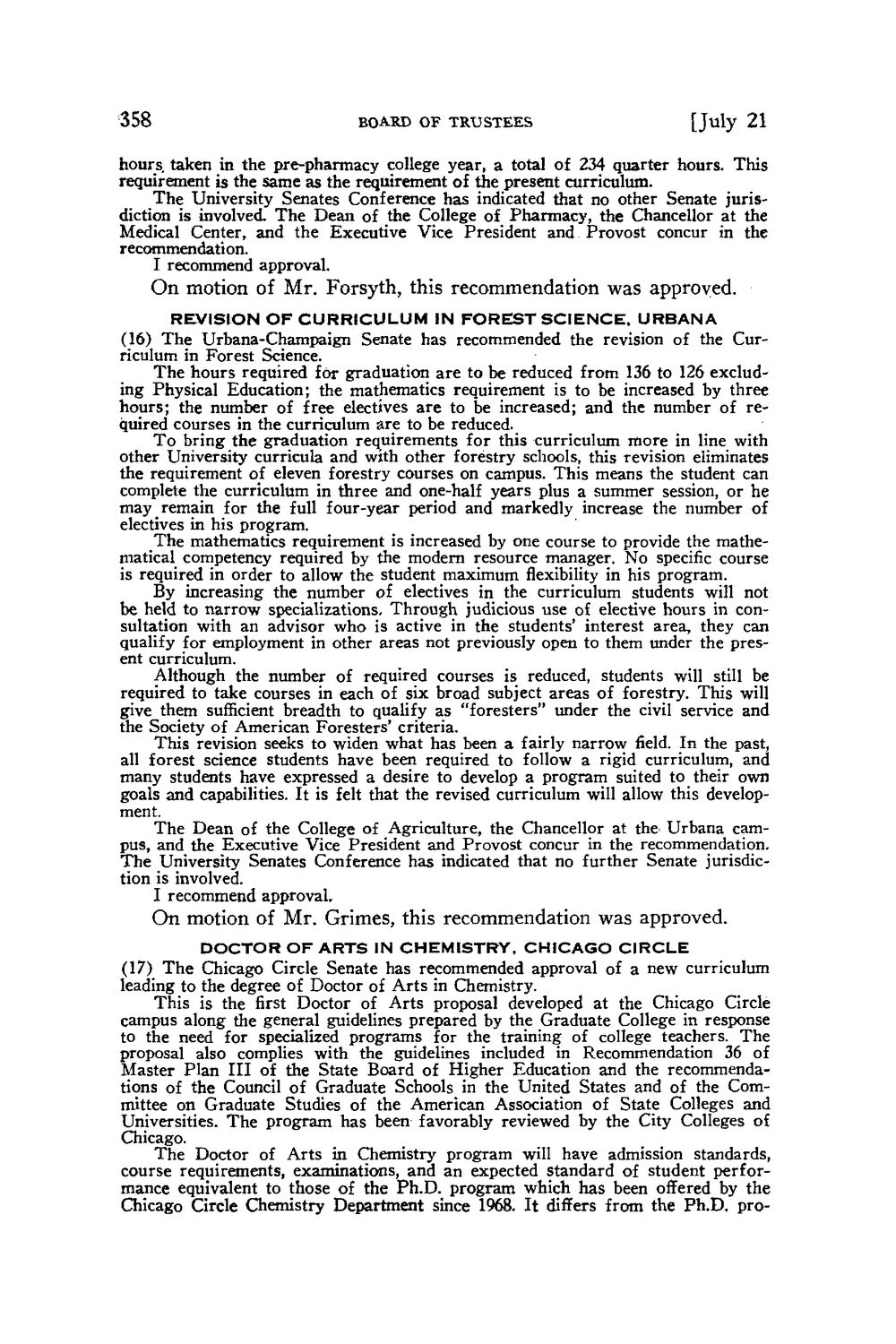| |
| |
Caption: Board of Trustees Minutes - 1972
This is a reduced-resolution page image for fast online browsing.

EXTRACTED TEXT FROM PAGE:
358 BOARD OF TRUSTEES [July 21 hours, taken in the pre-pharmacy college year, a total of 234 quarter hours. This requirement is the same as the requirement of the present curriculum. The University Senates Conference has indicated that no other Senate jurisdiction is involved. The Dean of the College of Pharmacy, the Chancellor at the Medical Center, and the Executive Vice President and Provost concur in the recommendation. I recommend approval. On motion of Mr. Forsyth, this recommendation was approved. REVISION O F C U R R I C U L U M IN FOREST SCIENCE. URBANA (16) The Urbana-Champaign Senate has recommended the revision of the Curriculum in Forest Science. T h e hours required for graduation are to be reduced from 136 to 126 excluding Physical Education; the mathematics requirement is to be increased by three hours; the number of free electives are to be increased; and the number of required courses in the curriculum are to be reduced. T o bring the graduation requirements for this curriculum more in line with other University curricula and with other forestry schools, this revision eliminates the requirement of eleven forestry courses on campus. This means the student can complete the curriculum in three and one-half years plus a summer session, or he may remain for the full four-year period and markedly increase the number of electives in his program. The mathematics requirement is increased by one course to provide the mathematical competency required by the modern resource manager. No specific course is required in order to allow the student maximum flexibility in his program. By increasing the number of electives in the curriculum students will not be held to narrow specializations. Through judicious use of elective hours in consultation with an advisor who is active in the students' interest area, they can qualify for employment in other areas not previously open to them under the present curriculum. Although the number of required courses is reduced, students will still be required to take courses in each of six broad subject areas of forestry. This will give them sufficient breadth to qualify as "foresters" under the civil service and the Society of American Foresters' criteria. This revision seeks to widen what has been a fairly narrow field. In the past, all forest science students have been required to follow a rigid curriculum, and many students have expressed a desire to develop a program suited to their own goals and capabilities. It is felt that the revised curriculum will allow this development. The Dean of the College of Agriculture, the Chancellor at the Urbana campus, and the Executive Vice President and Provost concur in the recommendation. T h e University Senates Conference has indicated that no further Senate jurisdiction is involved. I recommend approval. On motion of Mr. Grimes, this recommendation was approved. DOCTOR O F ARTS IN CHEMISTRY, CHICAGO CIRCLE (17) T h e Chicago Circle Senate has recommended approval of a new curriculum leading to the degree of Doctor of A r t s in Chemistry. This is the first Doctor of Arts proposal developed at the Chicago Circle campus along the general guidelines prepared by the Graduate College in response to the need for specialized programs for the training of college teachers. The proposal also complies with the guidelines included in Recommendation 36 of Master Plan I I I of the State Board of Higher Education and the recommendations of the Council of Graduate Schools in the United States and of the Committee on Graduate Studies of the American Association of State Colleges and Universities. T h e program has been favorably reviewed by the City Colleges of Chicago. The Doctor of Arts in Chemistry program will have admission standards, course requirements, examinations, and an expected standard of student performance equivalent to those of the P h . D . program which has been offered by the Chicago Circle Chemistry Department since 1968. It differs from the Ph.D. pro-
| |